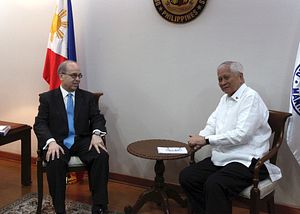During the first two months of this year, the United States stepped up its diplomatic engagement in Southeast Asia in support of the Obama Administration’s policy of rebalancing towards the Asia-Pacific. Assistant Secretary of State for East Asia and the Pacific, Daniel Russel, visited four countries in late January: the Philippines, Malaysia, Thailand and Cambodia.
On his return to the U.S. Russel addressed the Washington Foreign Press Center on the Administration’s priorities in the East Asia and Pacific region on February 4. Nine days later he hosted the 3rd United States-Singapore Strategic Partnership Dialogue in Washington on February 13.
Meanwhile, Assistant Secretary of State for Political-Military Affairs Puneet Talwar attended the 7th Vietnam-United States Political, Security and Defense Dialogue in Hanoi from January 22-23. United States diplomatic representatives also attended the first Extraordinary Meeting of the Friends of the Lower Mekong in Pakse, Laos on February 2.
Rebalancing and Domestic Issues
Russel’s visit to Southeast Asia underscored the salience of domestic issues as points of friction in bilateral relations. For example, implementation of the 2014 Philippines-United States Enhanced Defense Cooperation Agreement (EDCA) has been put on hold until legal petitions to the Philippine Supreme Court are heard.
U.S.-Philippines defense cooperation also has been bedeviled by public anger over the U.S. invocation of the 1998 Visiting Forces Agreement to prevent a U.S. Marine from appearing in court on allegations that he murdered a Filipino transgender woman.
Thai-U.S. relations remained strained by Washington’s disapproval of the May 2014 military coup that overthrew a democratically elected government and the slow return to elected civilian rule. The U.S. has not appointed an ambassador to Thailand since the coup.
































